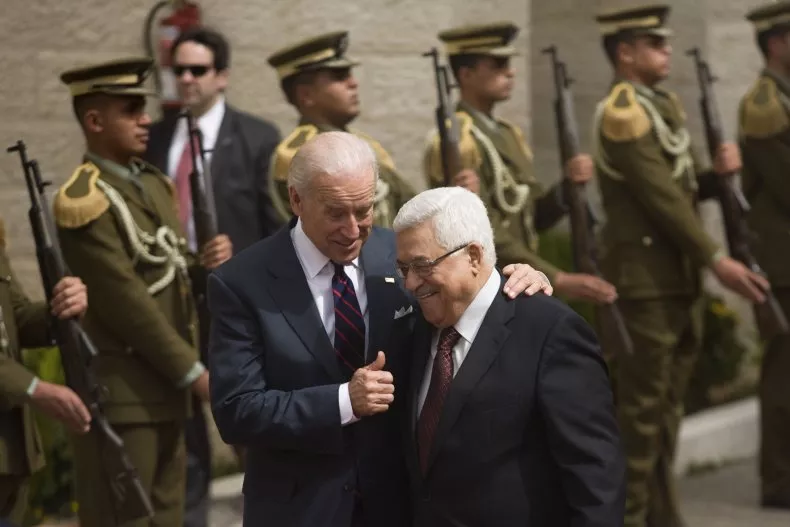Jared Kushner: On Iran, the U.S. Should Continue to Play the Strong Hand It Was Dealt
The roots of the Arab-Israeli conflict stretch back to when Arab leaders refused to accept the creation of the State of Israel after World War II and spent 70 years vilifying it and using it to divert attention from domestic shortcomings. But today, Muslims are posting pictures of peaceful visits to the Al Aqsa Mosque in Jerusalem, blowing a hole in the propaganda that the holy site is under attack.Mohammed Khalid Alyahya: The Price of Empowering Iran
The Abraham Accords exposed the conflict as nothing more than a real-estate dispute between Israelis and Palestinians that need not hold up Israel's relations with the broader Arab world. It will ultimately be resolved when both sides agree on an arbitrary boundary line.
While many were troubled by the Biden team's opening offer to work with Europe and rejoin the Iran deal, I saw it as a smart diplomatic move. The Biden administration called Iran's bluff. It revealed to the Europeans that the JCPOA is dead and only a new framework can bring stability for the future. When Iran asked for a reward merely for initiating negotiations, President Biden did the right thing and refused.
America holds a strong hand. Iran is feigning strength, but its economic situation is dire and it has no ability to sustain conflict or survive indefinitely under current sanctions. America should be patient and insist that any deal include real nuclear inspections and an end to Iran's funding of foreign militias.
Since the Biden administration's decision to reverse the designation of Yemen's Houthi militia as a foreign terrorist organization (FTO) on Feb. 12, drones and ballistic missiles have targeted Saudi Arabia 48 times. It is a fallacy to understand the region's politics as a contest between Saudi Arabia and Iran. Seen from Tehran, the central contest in the region is between the American alliance system and Iran's self-styled "resistance alliance."Abraham Accords: Getting a win-win for Israelis and Palestinians
Biden's misconception leads to a number of erroneous ideas: that the U.S. can play a neutral, mediating role between Riyadh and Tehran; that by distancing itself from Saudi Arabia, it creates opportunities for regional stability and understanding; and that it is the Saudi role in Yemen - and not the Iranian role - that has perpetuated the conflict in that country.
Iran has waged a forty-year war to spread its control across the region - not to compete with Saudi Arabia, but to undermine the American alliance system. Iran's network of terrorist groups in the region chant, "death to America," not "death to Saudi Arabia."
Iran's attacks on Saudi Arabian civilian infrastructure, via its proxies in Yemen and Iraq, are reactions to U.S. policy - not Saudi Arabian policy. Appeasing Iran, and punishing U.S. allies, will come at the expense of the entire region.
AT THE END of 2020, as part of the omnibus spending package, Congress enacted the Nita M. Lowey Middle East Partnership for Peace Act (MEPPA) with bipartisan support. MEPPA authorized a five-year, $250 million people-to-people peace-building fund and an investment initiative to give the bandwidth and budget to answer the question, “What are we doing to ensure the next generation of Israelis and Palestinians don’t hate one another?” Often an afterthought, MEPPA gives the administration a coordinated way to think about peace-building, not as a series of programs, but as an integrated policy tool.
Congress, wanting to leverage the groundbreaking American investment as well as maximize its efficacy, baked into MEPPA a multilateral element encouraging international donors. In doing so, Congress intended to harness the added legitimacy gained from multilateral endorsement of MEPPA in the eyes of Israelis and Palestinians and ensure equitable burden-sharing.
The Biden administration can use MEPPA to gather additional commitments from both the region and European allies to address incitement, dehumanization and economic disparity between Israelis and Palestinians. In doing so, the administration can utilize MEPPA to further the Abraham Accords, institutionalize new regional dynamics while providing needed economic stimulus to the Palestinian private sector, and deal head-on with adult and youth attitudes that must change if progress will be possible.
The advantages that the Abraham Accords have created should not be quarantined to just the fight against a nuclear Iran. MEPPA offers the ideal way to capture the new regional spirit to elevate aspirations for a just, sustainable and lasting peace between Israelis and Palestinians.
MEPPA sets in motion long-term grassroots peace-building combined with joint Israeli-Palestinian economic development projects to support future diplomacy. It also enables an early opportunity for the US to repair relations with the Palestinians, cultivate a foundation of trust between Israelis and Palestinians, rebuild trust with European partners, and capitalize on the regional normalization dynamic in a way that prioritizes Israeli-Palestinian peace. MEPPA can show once again how US taxpayers can amplify and solidify their investment and impact through engaging allies, and how US leadership and innovation is still the indispensable ingredient for meaningful international cooperation.













































